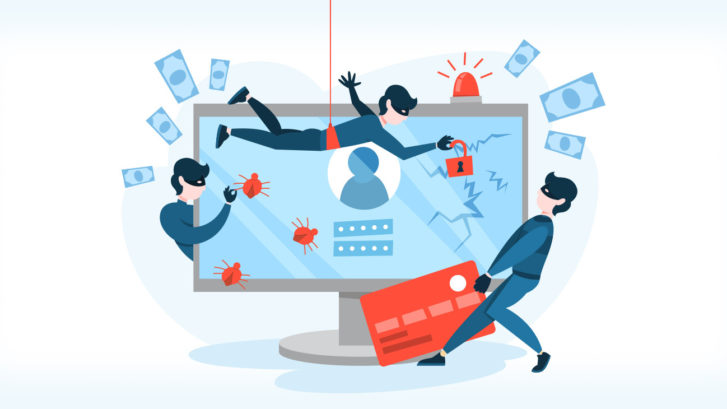Have you ever “gone fishing”? No, we don’t mean actually casting a line into a body of water to catch dinner. We mean “gone fishing” as the great Urban Dictionary defines it: checking out from reality, to be unaware of what’s going on. It’s being in the same state of mind you’d be in if you actually took the day off from work to hit a few mountain streams. The expression is often used in a condescending way. But just like fishermen catch fish, those who phish or vish aim to catch those who may have mentally gone fishing. Is this comparison a bit much? Let us sum up.
In this article, we cover:
- What it means to be “gone fishing”
- The definition and threat of vishing
- 5 ways to protect your employees from vishing scams
Phishing, as you’re probably aware, is when a scammer attempts to trick you out of your personal information. It usually happens when hackers impersonate someone else or a whole organization. Think about robocalls where the perpetrators pose as the FBI, the IRS, or your own financial institution. Many people are adequately skeptical to dodge this attack, but enough are asleep at the wheel or in a vulnerable position to be deceived. Perhaps they were anticipating a call about their taxes or were nervous about the authorities calling about some indiscretion. That’s why it’s called phishing — they are looking for a nibble from an unsuspecting, vulnerable victim, just as a fisherman is hoping for a nibble from a hungry sea creature. Phishing, like fishing, is a pursuit of opportunity.
Vishing is the act of misrepresenting who one is through deceit, trickery, or deception, specifically using voice or a voice message. It’s one particular form of phishing where voice and voicemails are used instead of email or text.
Last year, international students at Purdue University were targeted. They received several calls in which the students’ Social Security numbers were claimed to have been compromised and used fraudulently. The scammer would then solicit the students’ bank and credit card numbers to “fix” the issue.
Vishing attacks aren’t isolated to personal attacks. Employees at places of business are in fact humans too — humans who are vulnerable to vishing attacks, just like anyone else. The big difference is that there is so much more to lose in a place of business. It behooves business owners to find ways to protect their employees from vishing attacks. Here are five simple ways to fight vishing attempts.
- Don’t get frazzled
Don’t let callers “speed up” your employees. Scammers like to create a sense of urgency. If your employee doesn’t act right away, dire consequences are threatened. This leads to rash decisions. Rash decisions usually result in poor choices. Train your employees to remain calm in the face of adversity, particularly on the phone with an unverified caller. - Be skeptical
Carrier caller ID can’t always be trusted. Just because the caller claims to be with the IRS and the caller ID says the same doesn’t mean it’s a 100 percent lock. The FCC has put protocols in place to begin making caller ID more reliable, but it’s still in its early stages. Just as the mighty Apple struggles to close security holes in iOS, despite its billions of dollars of resources, voice service providers struggle to stay ahead of scammers and hackers. As old security holes are closed, new ones are always being opened up. In other words, to get comfortable too soon and behave as though your security is airtight is the worst thing you and your employees can do. Always stay skeptical of callers’ intentions. - Get a good call blocker
Thankfully, you can do better than to rely on the default call blocker your phone comes with. Apple and Android have plenty of more mind-blowing tech innovation to develop than the world’s best call blocker, which rarely gets standing ovations at keynotes. But worry not, YouMail can take this one. Our easy-to-use technology allows anyone, including your employees, to block spam calls. We protect more than 350 million phone numbers, stopped over a billion robocalls, and amassed the data needed to accurately block malicious vishing attempts. Just set up your professional plan, whether you’re an entrepreneur, a growing start-up, or an established small business, we have a plan to suit your needs and protect you from the vishing riff-raff. - Train your employees
It all comes down to training. Awareness and foresight are the keys to making the right decisions when you’re under attack. Act as though you’re immune to vishing attacks, and that will be your first big mistake. No one wants to be the one responsible for allowing a successful attack. Take the time to train your employees right, and they will thank you for it. - Get a second phone line
Another low-key way to protect your employees from vishing attacks is to provide them with a second phone line. In this day and age, the borders between work and personal life are more blurred than ever. If your employee is taking calls on his or her personal line, your business interests are easier to compromise. By providing your employees with a second, virtual phone number, not only will they become more productive, potential security threats will be closed because they will be able to more easily separate business calls from personal calls. And once again, it’s YouMail to the rescue. In addition to our business-class call blocking services, we provide virtual phone numbers, ultra-customizable voicemail greetings, cloud-based visual voicemail, and more.
Never get caught “gone fishing” again — you or your employees. Shut down all vishing attempts by choosing a YouMail Professional plan for your team today.

